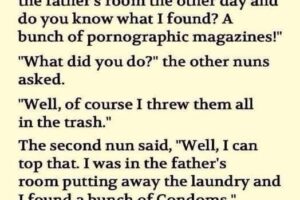The hospital room still smelled faintly of antiseptic and warm cotton sheets. I remember looking at that photo—my husband, holding my hand, smiling beside me. Our newborn was swaddled in pale blue, nestled in my arms, while our five-year-old clutched a balloon at the foot of the bed. From the outside, we looked whole—a happy family of four, ready to head home.
But while the nurse handed me the discharge paperwork, my eyes snagged on a detail I wasn’t meant to notice. Under “Emergency Contact,” there was a name I didn’t know.
“Who’s Alana?” I asked, casually at first.
I saw the color drain from my husband’s face. The paper trembled slightly in his hands.
“It’s… just someone from work,” he stammered, hesitating. “It’s protocol. I didn’t think it mattered.”
The room tilted. My grip on his hand loosened. “Someone from work? You’re married. We have two kids. Why is your emergency contact not me?”
He rubbed the back of his neck, a gesture I knew well. It was his tell when cornered.
“It’s not what you think,” he said finally. “It’s complicated.”
The nurse muttered an awkward apology and slipped out, leaving the air thick and stifling. My pulse roared in my ears. I looked down at our newborn, his tiny chest rising and falling peacefully, utterly unaware that the ground beneath our family had just shifted.
“Complicated how?” I asked, my voice low so as not to wake the baby.
He sank into the small plastic chair by the window and exhaled. “Her name is Alana. She’s in logistics. Last year, after… after the miscarriage, when you withdrew, I didn’t know how to reach you. I was scared, lost. Alana just… listened. That’s all it was.”
I stared at him, feeling like betrayal was swelling inside me, pressing against my ribs. “Listened? You’re telling me nothing happened, yet her name is listed where mine should be?”
Silence answered louder than words could.
Back home, sleepless nights stretched on. Our newborn whimpered in his cradle beside me. Our five-year-old snored softly in his dinosaur-print bed. My husband slept next to me, oblivious to my stare boring into his back.
There were no hotel receipts or lipstick stains. No clandestine texts or whispered calls. But something had been broken. He had carried his fears to someone else when I was at my lowest, instead of to me.
Days later, I asked again. The house was quiet; the kids were asleep. I sat him down at the kitchen table and asked plainly, “Did you have an emotional affair?”
He froze, then nodded. “Yes. But that’s all it was.”
“Did you love her?”
“No,” he said quickly. “She made me feel seen. You shut me out. I felt like I was drowning.”
I swallowed hard. It was true—I had withdrawn. After the miscarriage, I built walls around my grief, thinking if I pretended to be fine, maybe I would be. What I didn’t realize was that while I was clawing my way out of the dark, he was adrift in his own storm.
“I should’ve told you how lost I felt,” I admitted, my voice barely a whisper. “And you should’ve told me, too.”
We agreed to counseling. I wasn’t ready to abandon our marriage, but I couldn’t pretend nothing had changed.
Therapy cracked open everything we’d buried. I learned that on the day of the birth, he panicked. Unsure if he could handle fatherhood again after our loss, he called Alana instead of me. She didn’t answer. That’s why her name was still on the hospital form.
The therapist said something that lodged in my chest like a splinter: “Sarah, do you feel safe with him now?”
I had no answer.
Weeks blurred into months. He cooked dinners, slipped handwritten notes into my handbag, woke for night feedings so I could sleep. He was trying. And slowly, feelings I thought were dead flickered back to life—but a guarded part of me stayed awake, always watching.
Then, while sorting old baby paperwork, I found a small leather notebook tucked into a drawer. Curious, I opened it and began to read.
It wasn’t lists or reminders—it was letters. To me.
“I miss us before we broke,” one entry read. “I’m not chasing Alana. I’m chasing you. But I don’t think I deserve you anymore.”
Sitting on the floor, clutching those words, I broke. I sobbed until my throat ached.
The next morning, I left the kids with my sister, packed a small bag, and drove to the coast. I needed space to think.
At a weathered seaside café, an elderly woman slid into the chair across from me uninvited. With a warm but knowing smile, she asked, “Are you running from something, or toward something?”
I let out a bitter laugh. “Both.”
She nodded. “Truth usually sits in the middle.”
Two days later, I returned home. My husband’s eyes were red-rimmed.
“I thought you were leaving,” he said, voice cracking.
“I thought I might,” I admitted. “But I’m not ready to decide.”
That night, we talked—not defending, not blaming. Just… talking. I realized then that I still loved him. And beneath his guilt and fear, he still loved me. That love hadn’t left. It had just been buried.
We decided to try again. No grand declarations—just small steps: walks after dinner, monthly date nights, shared journals where we wrote down thoughts too fragile to say aloud.
Months later, a Facebook message appeared from Alana. I almost deleted it.
But I opened it.
“Sarah, I’m so sorry. I should never have let things get so close. He spoke of your strength often—he admired you, even when you couldn’t see it. I’m moving away, working on myself. I hope you’re okay. Peace to you.”
I didn’t reply. But for the first time, I felt a thread of anger loosen.
On our anniversary that spring, my husband surprised me with a trip to the same beach where I’d once sat, thinking I might end our marriage. We walked barefoot along the shoreline.
“Thank you,” he said softly, “for not giving up on us.”
I looked at him—older, wearier, but undeniably mine—and said, “Thank you for finally showing up.”
A few months later, our five-year-old came home with a school assignment titled The Family That Nearly Broke but Didn’t. His teacher had tucked it into a red folder, praising its honesty.
He’d drawn a house in a storm, roof shaking, windows cracked. Inside, stick figures held hands, braced against the wind.
Reading it, tears blurred my vision. Children see more than we think.
We’re not perfect now. We still argue. We still stumble. But we face it together.
The turning point came when our baby took his first steps. He wobbled, teetered, and nearly toppled—but my husband was there, catching him before he hit the floor.
In that moment, I knew: he might stumble, but he wouldn’t let us fall again.
Love isn’t tested when everything’s easy. It’s tested when it’s cracked wide open, when fear and misunderstanding threaten to swallow it whole.
Every day, we have a choice: let the cracks destroy us, or let love grow through them.
I chose to rebuild.
And somehow, against all odds, love feels stronger now—not because it’s flawless, but because it survived the fire.



